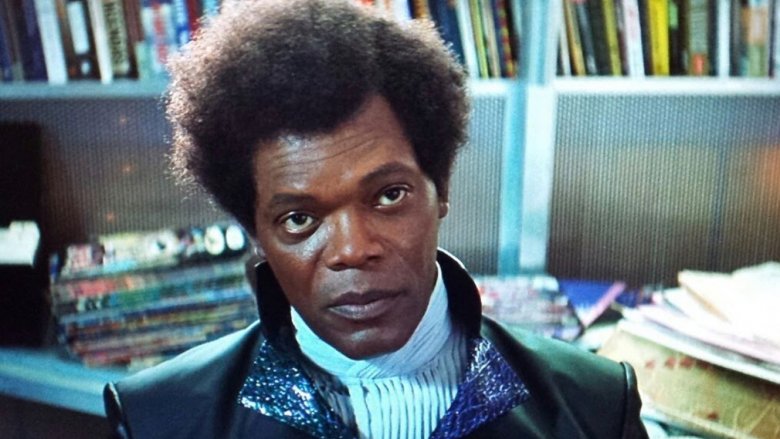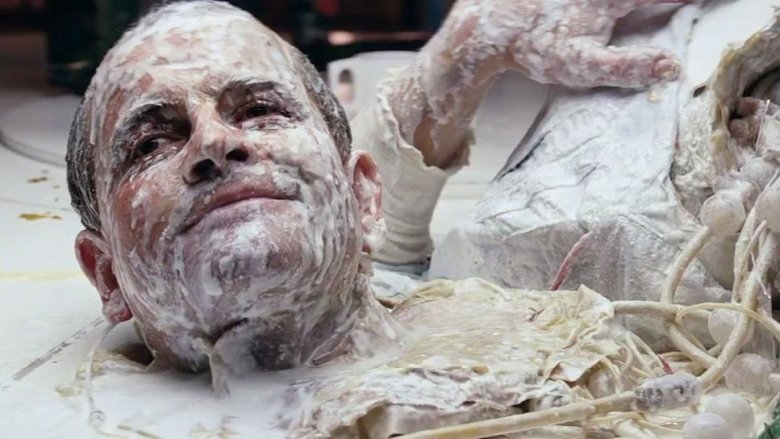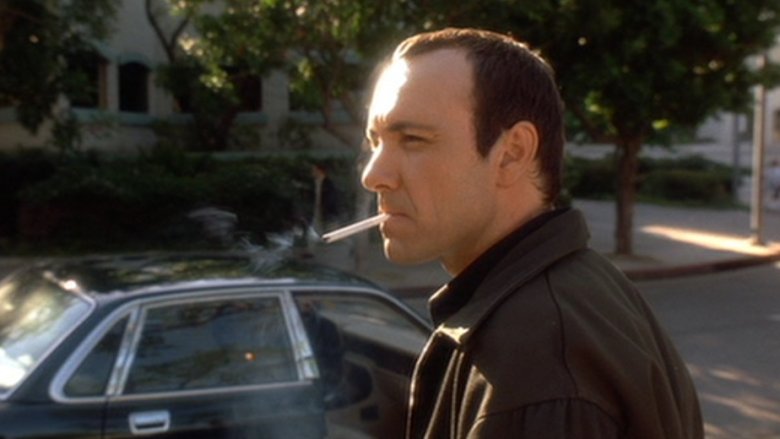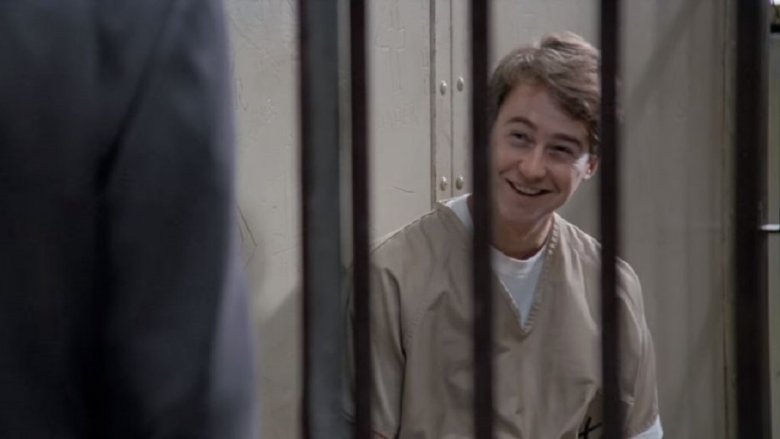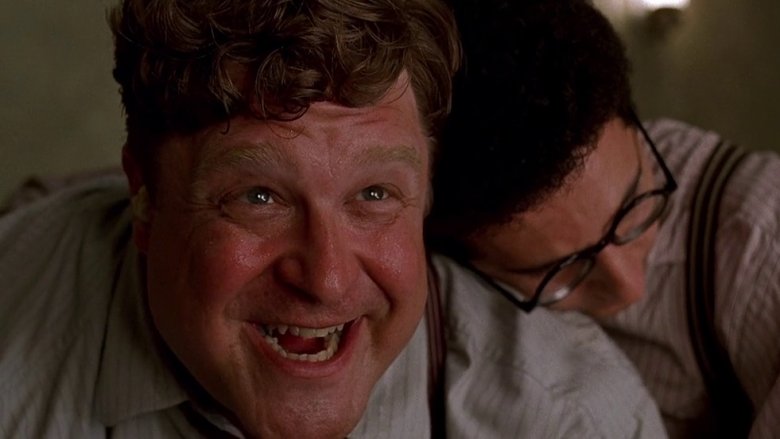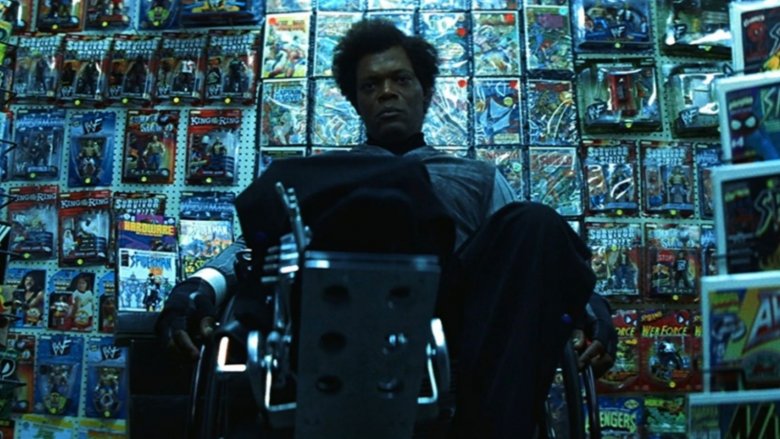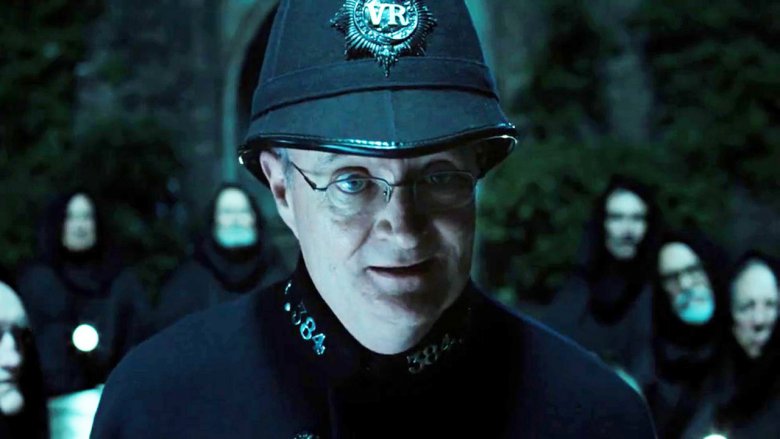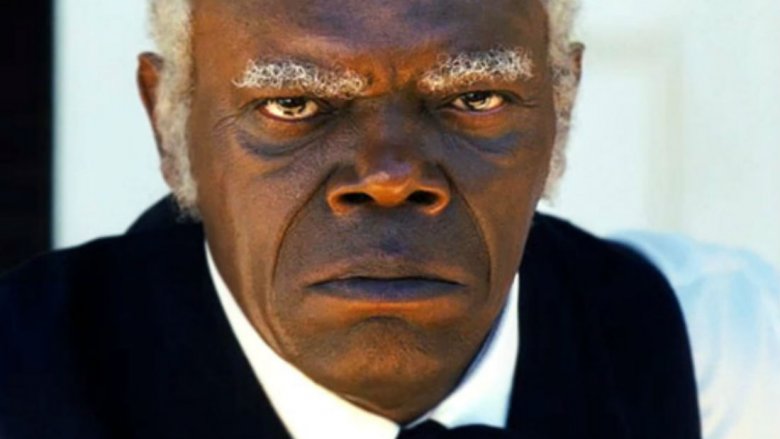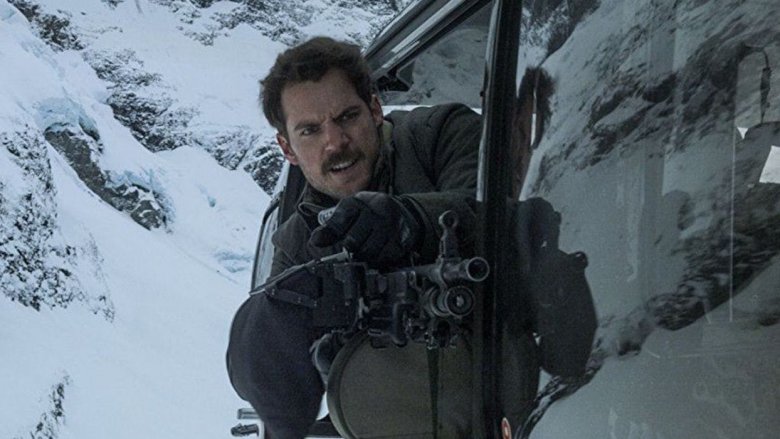The Greatest Bad Guy Twists Of All Time
It's hard to trust anybody these days. One minute, you think a guy is your best friend; the next, you're discovering that he's actually your archenemy, and he's been plotting your downfall since you met. Okay, that's a bit dramatic, but everybody knows what it feels like to be betrayed. Maybe that's why bad guy movie twists are so memorable — we can totally relate to the hero when she discovers her friendly neighbor is actually a serial killer, when her buddy is revealed to be a supervillain, or when her partner turns out to be a psychopath. Not all bad guy twists stick the landing, but those that do can make us question everything we know, both on the silver screen and in real life. From dastardly doctors to government agents gone rogue, here's a look at some of the greatest bad guy movie twists of all time.
Ash isn't all he seems
Directed by Ridley Scott, Alien finds a group of space truckers cruising through the universe when they pick up a mysterious call from a nearby planet. When they go to investigate, they encounter a clingy creature who makes itself at home on a dude's face. Naturally, the truckers want to take their fallen comrade back into their ship for help, but Warrant Officer Ellen Ripley (Sigourney Weaver) knows that bringing an alien parasite aboard would put everybody at risk.
And that's when Ash just opens the door and lets the facehugger inside.
Played by Ian Holm, Ash has been a stickler for the rules up until now, but hey, he's a medical officer. His job is to save lives. Sure, following containment protocol would be the best course of action, but what doctor is going to let his friend die via deep throat? Of course, when Ash brings the creature inside the Nostromo, he's more than tad fascinated by it. Granted, he's a scientist, so naturally he's going to be curious about alien lifeforms, and you can justify all of Ash's unusual behavior... until Ripley does a little detective work.
As it turns out, Ash isn't your typical medical officer. He's an android working for an evil corporation, sent to retrieve the alien no matter the cost. In fact, Ash is so dedicated to his mission that he morphs into a pervy Jason Bourne and tries to murder Ripley with a rolled-up magazine. But even after he's decapitated and defeated, the android till gloats about how the Xenomorph is going to make short work of the crew. It's savage backstabbing stuff, so it's kind of cathartic when Ripley and company finally set his smirking face on fire.
And like that, he's gone
Written by Christopher McQuarrie, The Usual Suspects is a kickass caper that starts in the aftermath of a heist gone very, very wrong. The lone survivor of this mission-turned-massacre is a meek but mouthy crook named Verbal Kint (Kevin Spacey), and when he's brought in for questioning by the cops, Verbal spins a twisty tale about the devil himself: Keyser Soze.
Soze is the bogeyman of the criminal world. No one can catch him — nobody knows if he's even real — but everybody knows his name. He's the ultimate puppet master, setting up elaborate crimes and murdering anybody who gets too close. And that's exactly what happened to Verbal and his criminal crew: They were forced to perform an impossible heist, and then Soze picked them off one by one.
Well, that's what Verbal says, anyway, but U.S. Customs Special Agent Dave Kujan (Chazz Palminteri) is skeptical. He doesn't believe Soze is some mystical criminal warlord. Instead, he thinks Soze is Verbal's missing friend, Dean Keaton (Gabriel Byrne), and Kujan bullies the disabled Verbal into implicating Keaton as a killer. Satisfied with a job well done, Kujan lets Kint go... before realizing he just made the biggest mistake of his career.
Looking around the room, Kujan notices all the wanted posters and fliers taped to the wall, and the names and places he's reading all sound kind of familiar. And that's when it hits him: Verbal has been lying the entire time, using details from around the interrogation room to create an elaborate story. Only it's far too late to catch Verbal, as his palsy has disappeared and his mild-mannered attitude has turned cocky and cold. We watch the confident crook stride down the sidewalk and realize there never was a Verbal Kint. He was Keyser Soze all along — and then just like like that, he's gone.
There never was an Aaron
Primal Fear finds Richard Gere playing a smarmy lawyer named Martain Vail, a guy who loves seeing his name in the paper. He gets that sweet media attention by helping big-name clients get out of big-deal trouble, so when a stuttering altar boy with a southern drawl murders the archbishop of Chicago, Martin simply can't resist a case that juicy. The altar boy in question is Aaron Stampler (Edward Norton), a sensitive young man who couldn't harm a fly. Martin's alter ego, on the other hand, could totally kill a man of the cloth. Roy is Martin's psychopathic side, and whenever he appears, Aaron blacks out and loses his memories and sense of time. And that's too bad, because bad things happen when Roy is around — like a prosecuting attorney getting strangled in the middle of a courtroom.
That crazy outburst — coupled with Martin's top-notch lawyering—is enough for a judge to find Aaron not guilty by reason of insanity. But before Aaron is shipped off to a mental hospital, he asks Martin to tell the prosecuting attorney he's sorry for choking her. And that's when things click for Martin. If Aaron can't remember what happens when Roy takes over, then how did he know Roy attacked a woman in court? Suddenly, Aaron's shy facade melts away, and the psychopath takes over. There was never a split personality. In fact, there was never even an Aaron. It was always Roy, sane, smiling, and now scot-free. But before he goes, he twists the knife by congratulating Martin on discovering his scheme, giving the devastated defense attorney a condescending, "Good for you, Marty."
The life of the mind
The Coen brothers knew what they were doing when they cast John Goodman as Charlie Meadows in their surreal masterpiece Barton Fink. The Coens actually wrote the part with Goodman in mind "because of his warm and likable image." And Charlie certainly is a lovable sort. He's an affable salesman, and even though he's living in the crummiest hotel in L.A., he's got a bright smile and lots of stories to tell if anybody wants to listen. And all he really wants to do is just have a nice chat and wrestle with his neighbor, Barton Fink (John Turturro). Barton is a New York playwright who just got a screenwriting gig. Barton says that he wants to tell stories about the "common man," but whenever Charlie tries to shed some light on what it's like being an Average Joe, Barton just shuts him down with his playwright ramblings.
We really start to feel for Charlie, as Barton patronizes him every time he opens his mouth. But Charlie doesn't hold a grudge, and when Barton needs help disposing of a body, the salesman steps in to save the day. He seems like the perfect neighbor, somebody who deserves better than Barton, but when Charlie isn't trying to tell stories, he's busy murdering folks. As the film unwinds, Barton learns his neighbor is actually the infamous Karl "Madman" Mundt, a serial killer with a fondness for shotguns and decapitating heads. His murderous rage is almost supernatural, like he's a devil from hell, and when he promises to show some unfortunate soul "the life of the mind," you know Barton regrets not listening to Charlie's tales.
They called me Mr. Glass
Directed by M. Night Shyamalan, Unbreakable isn't just a superhero origin story. It's also a supervillain story couched in smoke and mirrors until the very end of the film, and that supervillain is Elijah Price (Samuel L. Jackson), a comic book collector whose bones are incredibly brittle. Price wonders if maybe his exact opposite exists somewhere in the world, a man who's — you guessed it — unbreakable.
David Dunn (Bruce Willis) is that unbreakable man, but he needs a mentor to guide him along. When Elijah learns that David survived a devastating train wreck without a scratch, he brings the depressed security guard under his fragile arm. Despite David's doubts, Elijah puts him on the path to superhero glory, encouraging him to use his strength and psychic powers to stop evildoers. And by fighting the bad guys, David finds a peace and fulfillment he's been searching for his whole life.
Of course, up until this point in the movie, David thinks Elijah is a good-hearted dude, right until he goes to shake the man's hand. Skin-to-skin contact triggers David's sixth sense, which lets him see a person's most evil deeds. And when he wraps his fingers around Elijah's, he discovers his broken benefactor is actually a terrorist who's destroyed buildings, planes, and even the train David was riding, all in a quest to find a super survivor. By dedicating his life to finding a real hero, no matter the cost, Elijah discovers he's the Lex Luthor to David's Superman. Elijah even goes so far as to adopt his childhood nickname as his new alter ego, and in the final few seconds, he proudly proclaims himself to be Mr. Glass.
Make Sanford great again
When Sgt. Nicholas Angel (Simon Pegg) of Hot Fuzz is exiled to the sleepy English town of Sanford, it looks like his exciting police career is coming to an end. Instead of busting drug dealers, his days involve nabbing underage drinkers and searching for a runaway swan. Of course, that all changes once people start dying in horribly gruesome ways.
We've got decapitations, explosions, and garden shears where they shouldn't be. And just like that, Nicholas finds himself in the biggest mystery of his career. Too bad nobody in town believes there's a killer on the loose. Shockingly, everyone insists these are all just random accidents. The Neighborhood Watch Alliance — a group of elderly busybodies with little tolerance for tomfoolery — assure Nicholas there's no foul play afoot. Even Nicholas' new boss, Inspector Butterman (Jim Broadbent), thinks the sergeant's imagination is running wild.
But Nicholas is no fool, and he suspects local businessman Simon Skinner (Timothy Dalton) of picking off people as part of an elaborate financial scheme. And as it turns out, our boy is kind of right. Skinner really is a killer... but so is almost everybody else in town. The couple who owns the bar, the priest, the hag from the hotel, and every other member of the Neighborhood Watch Alliance are all guilty of countless killings. However, it has nothing to do with money; instead, this secret society is dedicated to making Sanford great again by killing anyone who might hurt the town's reputation, from lousy actors to living statues. Even Inspector Butterman, that smiley old man we trusted so much, is part of this crazy cult that believes a bit of gore is worth it for the greater good.
The real king of Candieland
Directed by Quentin Tarantino, Django Unchained pulls a slick bait-and-switch on its audience. Throughout the film, we're led to believe that plantation owner Calvin Candie (Leonardo DiCaprio) is the big bad. After all, he murders and tortures almost every slave who winds up in his sights. And there's no denying that Candie is a monster, but while he's plenty evil, he's not the one really calling the shots at Candieland.
Instead, the Candieland crown belongs to Stephen (Samuel L. Jackson), the house slave and real head honcho around the plantation. But you wouldn't know that when Stephen first steps into frame. He comes out of the big house all cranky and cantankerous, dropping "yassirs" and squawking about Django's (Jamie Foxx) bad attitude. At first, it seems Jackson is playing Stephen like some Gone with the Wind stereotype, but while he seems like an ornery old coot, there's a lot going on behind Stephen's cold, hard eyes.
That becomes incredibly clear when we see him reclining in a leather chair, sipping a brandy, looking like a James Bond villain. Back in this private room, Stephen can talk down to Calvin and bend his "master" to his will. He's far smarter than Candie, who has no idea that Django is here to rescue his long lost wife (Kerry Washington). But Stephen had Django pegged from the moment he arrived, and he immediately begins plotting ways to bring our hero down. A master manipulator and a traitor to every slave in the South, Stephen is the real monster of Candieland, so when Django fill the sadistic slave full of lead, it's actually a pretty sweet ending.
Amazing Amy is amazing at being awful
Nick Dunne is no angel. Played by Ben Affleck in Gone Girl, Nick is a lazy, self-obsessed sleaze who cheats on his wife with a younger woman. And for a while, it looks like Nick might be a murderer. His wife, Amy Dunne (Rosamund Pike), has disappeared, and the evidence is utterly damning. There's blood on the floor, an incriminating insurance policy, and a hidden pregnancy. There's proof Amy tried to buy a gun for self-defense, and she kept a detailed diary that says something like, "Yeah, I think my husband is going to murder me."
So it's easy to understand why the cops would arrest Nick for Amy's murder. And while moviegoers might have some reservations about Nick's guilt, we know Amy doesn't deserve whatever horrible fate has befallen her. After all, in flashbacks, we see how sophisticated, intelligent, and cool she is. She inspired an entire series of children's books called Amazing Amy, so she must be pretty amazing, right?
Well, Amy Dunne is certainly amazing at being awful. Midway through the film, we discover she's alive and well and framing her husband for a murder he didn't commit — her own. She wants to teach him a little lesson about taking her for granted, and she's so hardcore about getting revenge that she's drained her own blood, stolen somebody's urine, and written pages and pages of fake diary entries. Amy is the textbook definition of a psychopath, and the woman we've seen in those romanticized flashbacks is a fake. The real Amy is far more cold, far more calculating, and far more cruel. In other words, she's just the kind of woman Nick deserves.
Superman goes rogue
Casting is key when it comes to priming your audience's expectations. If you want them to trust your hero, hire Tom Hanks. If you want them to boo the bad guy, get Gary Oldman. But casting can also be key when subverting expectations. For example, if you want moviegoers to trust a character only to later reveal he's an evil terrorist, then it makes sense to go with Clark Kent.
Written and directed by Christopher McQuarrie, Mission: Impossible – Fallout finds Ethan Hunt (Tom Cruise) in yet another race against time. After losing a case full of plutonium, Ethan is forced to tagteam with an equally headstrong agent, August Walker (Henry Cavill). Walker is supposed to be Ethan's shadow, staying right behind the IMF operative until he successfully retrieves the plutonium. There's no room for Ethan to screw up this time, because if he fails, the plutonium will end up in the hands of John Lark, a terrorist who plans to unleash chaos upon the world.
At first, Walker seems like a pretty good addition to the IMF team. He's big, brutal, and sports a handsome mustache. He's a good dude to have on your side during a bathroom brawl. Of course, as this is a Christopher McQuarrie movie, we've got to have at least one major twist, and after some spy shenanigans, Ethan realizes Walker is actually John Lark himself. The man has been manipulating the world from inside the U.S. government for years, hiding in plain sight. Granted, Ethan has faced tough problems before, but the fact that this hulking brute is now trying to kill him really isn't super, man.
Disney subverts a tired old trope
Love at first sight is a pretty standard Disney trope. Cinderella sees a handsome man and immediately wants to spend the rest of her life with him. Come to think of it, the concept of Prince Charming is pretty tired too. The dashing, wealthy man who will fix all your problems often appears in movies like Snow White. And when you mix these two tropes, you're going to give little kids some pretty unhealthy ideas about romance and marriage.
Fortunately, Frozen knows both of these tropes are ridiculous and spins them on their heads with the character of Prince Hans. Played Santino Fontana, Hans is a royal from the Southern Islands, and when he stops by the kingdom of Arendelle, he falls head-over-heels for Princess Anna (Kristen Bell). It seems their love is destined, and he gets his chance to prove it when Anna is wounded by her magical sister, Elsa (Idina Menzel). Anna's heart is slowly freezing, and soon she'll be a block of ice, unless she's saved by true love's kiss. So who else should rescue her except the man she plans to marry (after meeting him just once)?
Only Hans isn't too keen about that kiss. As it turns out, his plan all along was to murder Anna and Elsa and then take over Arendelle for himself. The whole "Love Is an Open Door" bit was just a cruel charade to ingratiate himself with Anna and position himself in line for the throne. In a traditional film, Hans would be the guy who solves every problem with the smack of his lips, but here, he's just an icy psychopath who's nowhere near charming.
